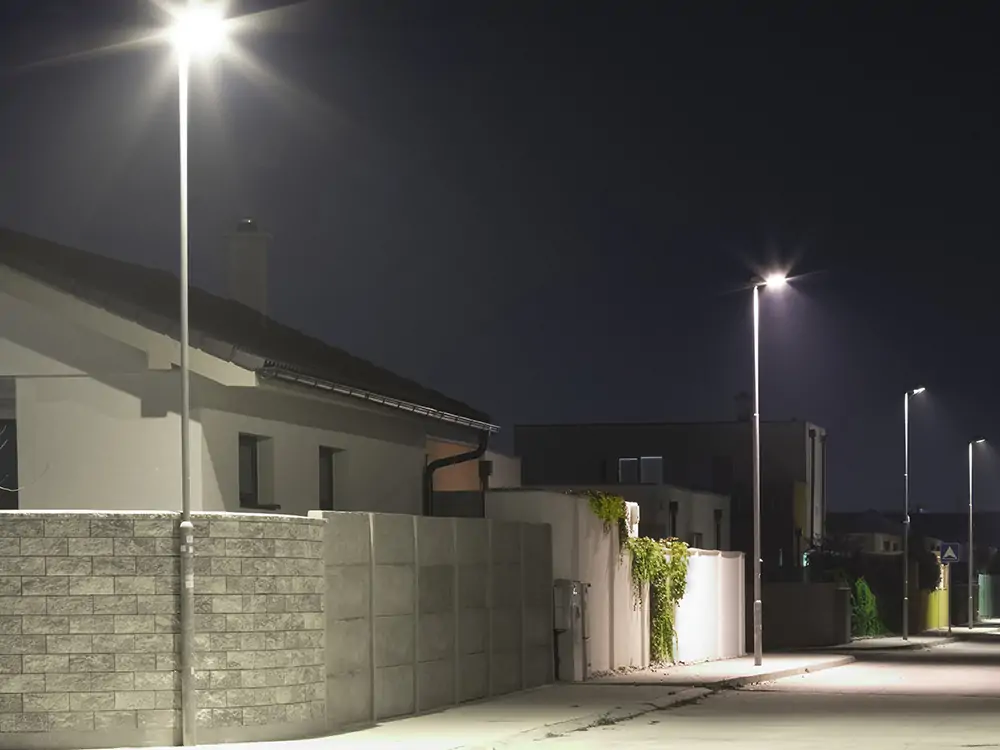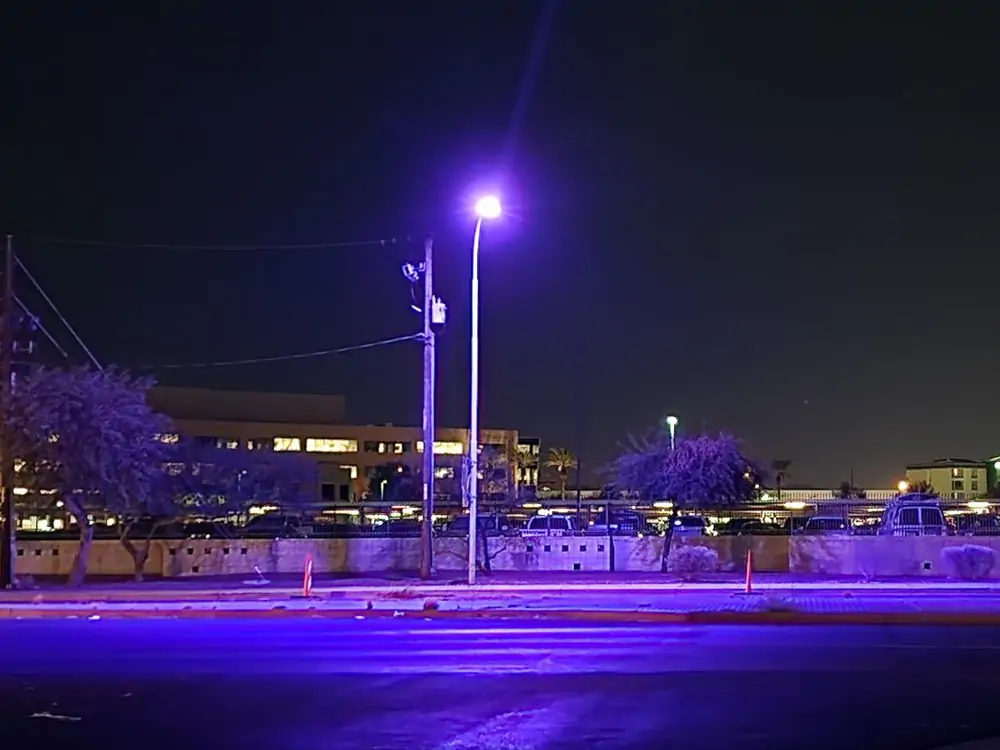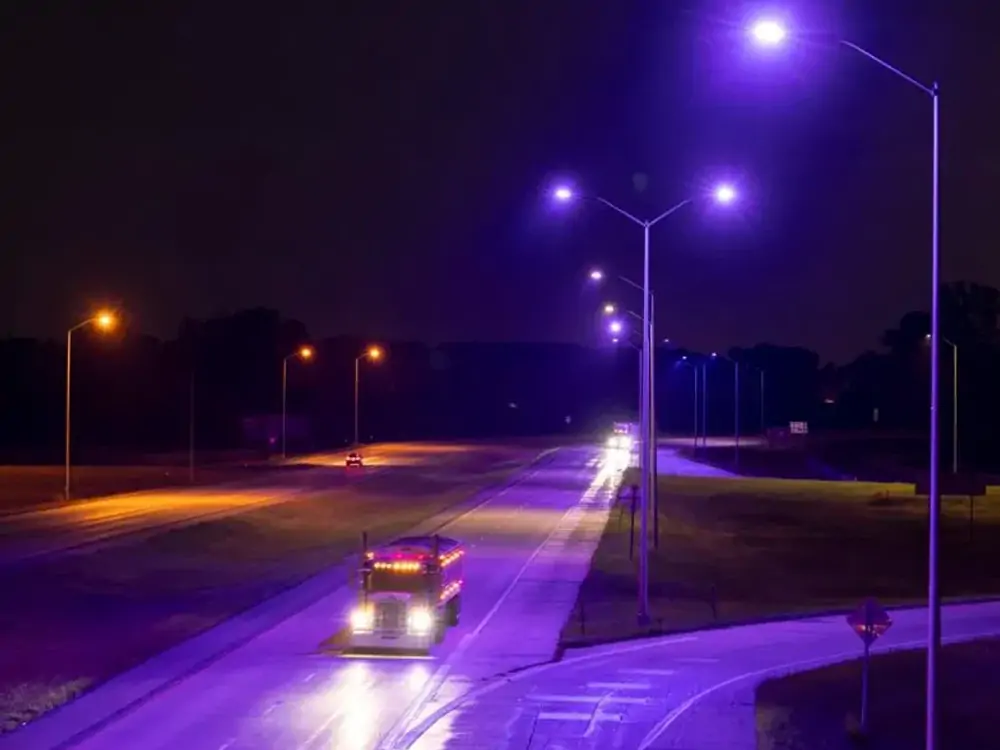Have you ever seen a purple LED streetlight across the road? For a while, it may look elegant and aesthetic. But they can be dangerous for drivers and pedestrians alike. Plus, how can this often raise the question: Why are street lights purple? Here is a quick explanation of the question.
In 2007, the city of Ann Arbor was announced to be the first American city to switch from sodium vapor lamps to LEDs. Later, many American countries started switching to LED streetlights. This not only eliminated the irritating yellow hue in the streets but also brought bright and clear LED illumination. Lately, the US and the globe have observed an odd new phenomenon of nocturnal color. There are reports of purple-looking streetlights popping across American streets.
Moreover, these street lights suddenly turn purple. This not only scares people but also poses health risks while driving. What are the reasons behind it? Why are LED street lights purple? Here is a blog discussing everything about LED lights and their purple color in detail.
But First, How to do White LED Streetlights Work

Before understanding the purple phenomenon, let’s first understand how white LED streetlights work. This might surprise you, but LED never produces light in white color. The modern streetlights work with light-emitting diodes. The diodes can emit light at different wavelengths except white. Thus, the white color we see is a mixture of two or more lights that together appear as white. There are two methods under which LED lights produce white light:
Method 1: Using Red, Green, and Blue LEDs
In general, LEDs emitting red, green, or blue combine into a single white light. However, generating red and green light requires more energy than other options.
Method 2: Blue-LED and Phosphor-Coating Combination
Another method involves using blue LEDs coated with fluorescent phosphorus. These absorb blue wavelengths and spit out red and yellow ones, resulting in a white beam. Most LED brands follow method two since it is more energy-efficient and affordable.
Then Why LED Turns Purple At Times
Now comes the main question: why are street lights purple? Why do white LED lights change to purple suddenly? Is there a miracle or science behind it? The exact reason behind this phenomenon is still unknown. And not every streetlight turns into a vibrant purple shade. However, the scientific hypothesis suggests that the delaminated phosphorous layer around the bulb can cause bright purple light. In simple words, the peeled layer of phosphorus exposes blue LED light underneath. Although it’s deep blue in color, it also has a violet shade that deviates more. Thus, rather than a bright white spectrum, purple light is transmitted through bulbs. In other cases, it can be because of malfunctioning or damaged LED lights.

What are the Reasons Behind Phosphorus Delamination in LED Streetlights?
Now, when you know the answer: why are street lights purple? You might be wondering what are the reasons behind delamination in LED streetlights. Well, there can be many reasons behind it. Here is the list of factors that might peel off the layer from LED lights:
- Continuous operation or functioning of LEDs
- Heat buildup inside the light fixture
- Vibrations from passing cars
- Gravity affecting the phosphor layer
The Effect of the Purple Light
The reasons behind the garish purple of the LEDs are still unclear. But, it gives rise to another question: what are the effects of the purple light? How does it impact the drivers and pedestrians, or is it harmful? Obviously, the purple light has a different frequency, and it can impact the photoreceptors. Human eyes consist of two types of photoreceptors- cones and rods.
Cone works in bright conditions, and rods in dim conditions. But rods are more sensitive to blue light and can’t detect other colors. Thus, it becomes harder for humans to focus in purple light because of the limited blue-sensitive cones in the eye. The limitation of rods might also make it difficult to differentiate colors. Everything may appear blue or black, which can be risky while driving.
At the same time, unlike bright white light, purple light can reduce the net brightness. It makes the streets a dimmer and darker place, impacting visibility and safety for both drivers and pedestrians. The purple color of the streetlight affects not only humans but also animals. Insects like moths and other nocturnal insects are attracted to blue and purple light. This light disrupts their natural behavior pattern and causes troubles in their lifestyle. Moreover, this light can be fatal for pollinators, bats, and owls. Thus, it can change the local ecosystems in the long term.
Is There Any Way to Reduce the Impact of Purple Streetlights?

Here are a few ways through which you can reduce the impact of purple streetlights:
- Replace the failed and flawless lights as soon as possible.
- Switch to amber-colored LEDs instead of bright white lights.
- Avoid wearing sunglasses at night.
- Skip blue-light-filtering glasses at night.
What To Do When You See a Purple LED Light
When you spot a purple LED light while walking or driving across the street, be careful. It can affect the quality of vision or cause other health hazards. You can also try to contact the operators about the malfunctioning lights. They will come and repair the light soon to restore its original color.
Final Thoughts
LED street lights are an advanced technology that has revolutionized the global game. They are durable and versatile and illuminate streets in the finest way possible. But no technology can widen without limitations, and purple lights are one such limitation that can be harmful.
While the exact solution is not in the market right now, one thing is clear. Why are street lights purple? We hope that now you know the answer to this question. Another thing is that science and technology are revolutionizing every day. Thus, you need to worry about this issue in the long term. As the LED market moves towards efficiency and affordability, there soon will be a permanent solution. In simple terms, the purple lighting phenomenon is just a hiccup that will turn more into a memory in the coming times. Until then, be careful and drive safely!
